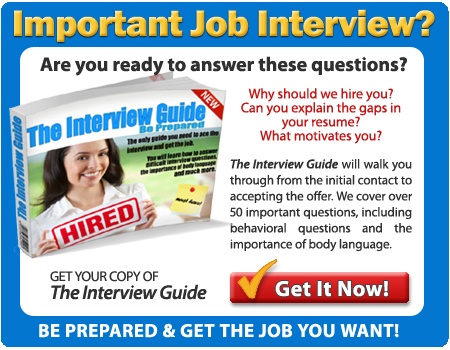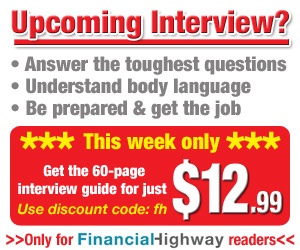- 15shares
- Facebook10
- Twitter2
- Pinterest1
- Google+2
Are you in the midst of hunting for a new job? If you’ve already gone to a few interviews, then you know that many potential employers ask the same interview questions over and over again. Oddly, many people still show up unprepared with good answers to these common interview questions. If you get smart and come up with a good answers in advance, then you’re going to be one step ahead of the people you’re competing with at the job interview.
Here are the 30 most common interview questions and how to answer them.
Q: Can you tell me a little bit about yourself?
Nearly every interview that you go to will kick off with this basic question. You want to keep your answer concise but information-packed. Briefly explain your educational and employment experience with one or two sentences. (After all, the employer can already see that in your resume.) Follow up with additional information about what you are passionate about (relevant to the job) so that you impress the employer immediately with your enthusiasm. Keep all irrelevant personal information out of your answer.
Q: Why are you interested in working with this company?
There are several different things that an employer may be trying to get at when asking this question. Address them all in your answer, and you’ll have a successful interview. Those things include:
- What do you actually know about our company?
- What skills do you bring to the company?
- Why are you even looking for a job in the first place?
- Why are you looking at getting a job that is below the status / pay of a previous job you’ve held?
Answer this common interview question by doing your research about the company and position before the interview and choosing a fact about the company that really interests you. Highlight this fact in the interview as a reason you want to work with the company, and then explain concisely how your skills dovetail with this.
If you are applying for jobs below your previous title, briefly explain that you realize that you may look overqualified for the position, but that you’re excited about the opportunity to learn some new skills from your younger co-workers while serving as a mentor as appropriate in specific situations. You may also want to mention that you appreciate that you won’t be the leader in this new position, and that you have appropriate respect for your boss (even if he is younger or less experienced than you are).
Q: Do you consider yourself successful?
The correct answer is “yes”. You want to show off your confidence. However, you should never give a one-word answer in an interview, so you’ll want to follow up with a specific reason that you consider yourself successful. For example, you might say that you have set goals and achieved them. You should also note that you don’t feel that you’ve reached your pinnacle of success and explain why this new position will take you one step closer.
Q: What are your career goals?
You should think through this question before you go to an interview and come up with a truly honest answer that rings true for you. Then you should tailor this answer to be appropriate to the interview. If your goal is to enter an entirely different field, you need to explain clearly why this job is the perfect stepping stone to that goal. For bonus points, identify a well-known mentor in your field, and explain the assets and aspects of their career that are touchstones for your own career goals.
Q: How long would you expect to stay with this company if we hired you?
You want to make sure that you know in advance what type of position the company is hiring for and answer the question in line with that. For example, if it is a temporary position, then note that you are aware that it is a temporary position and that you would stay through the end of your contract with the possibility of being open to further employment — if it is offered. In general, you want to show that you’re not going to just jump at the next big chance, leaving this company in the lurch, so use this question to explain your commitment and loyalty to the projects that you take on.
We have partnered up with TheInterviewGuide.net for a great deal! You can now get the ultimate Interview Guide for $12.99 ONLY THIS WEEK! This guide covers much more than just interview questions, it is over 60 pages long and a MUST have if you are in the job market. Upon check out just enter code fh and you’ll see your discount. Good luck!
Q: Can you please explain the gaps in your resume?
Employers are fully aware of the fact that it’s tough to find a job right now so they’re not looking for an excuse about the employment gap . What they want to know is how you’ve been filling your time while you’ve been unemployed. Provide a thorough answer that explains what you’ve done and why it would benefit the employer. For example, if you took time off of work to stay at home with the kids, then focus on the fact that the skills required to manage a household will translate nicely to managing employees in your new position.
Q: What was your biggest challenge with your previous boss?
The most important thing to remember here is to stay positive. You don’t want to gripe and complain about your past boss, even if she was a devil. You want to be very brief in describing the challenge and then expand on that by focusing on what you did to overcome the challenge. If the end result was a positive one, then be sure to highlight that, emphasizing the part you played in coming to that end.
Q: Do you enjoy working as part of a team?
There is a subtle balance to be achieved when answering this question. You want to show that you can indeed be a great team member, collaborating with others and working together to produce a great end result. However, you also want to emphasize that you value the opportunity to share your own input and also that you have the ability to take instruction and run with it without having your hand held.
In order to achieve this subtle balance, you should answer that you do enjoy working as part of a team, but also that you aren’t afraid of taking on individual tasks, either. You should then provide two examples from your past; one that shows true collaboration and one that shows an ability to work independently in a manner that is an asset to the company.
A final note is that there are often gender stereotypes at play here that you should be aware of. Women are often seen as collaborative but unable to take initiative, so females should emphasize the portion of the answer that shows off their ability to take the lead on projects. On the other hand, men are sometimes seen as aggressive and unable to cooperate and take the lead from others, so their examples should emphasize their experience with collaboration.
Q: What role do you tend to play in a team?
Here you want to demonstrate your knowledge of the different roles within a team and show that you have a strength but can still be versatile. For example, you might say that you think it’s great that each team has a communicator, a leader, a note taker, etc. and that you tend to take on the leadership role but are also able to be a communicator or a note taker, as needed. Provide a brief example from a past experience at work.


